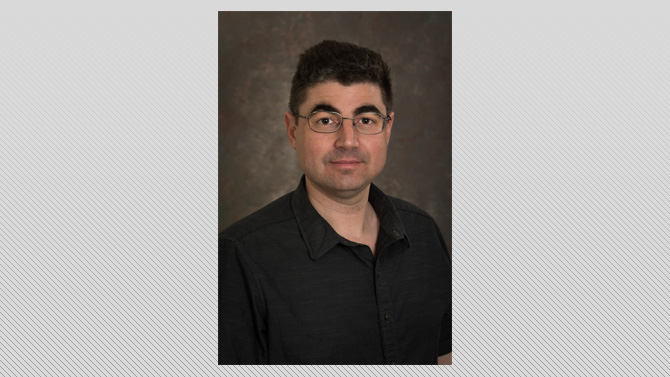


Heinz honored by Linguistic Society
Photo by Kathy F. Atkinson January 09, 2017
UD linguistics professor receives national Early Career Award
The University of Delaware’s Jeffrey Heinz, whose research on machine learning has applications in such fields as artificial intelligence and robotics, has received the 2017 Early Career Award from the Linguistic Society of America.
Heinz, a professor in UD’s Department of Linguistics and Cognitive Science, was presented the award on Saturday, Jan. 7, at the society’s annual meeting in Austin, Texas.
The Early Career Award was instituted in 2010 to recognize scholars in the first 10 years of their careers who have made outstanding contributions to the field of linguistics.
In naming Heinz as this year’s recipient, the society noted his “contributions leading to a new computational science of inference and learning as applied to language.”
The results of his research “could only be obtained through a remarkable synthesis of mathematical linguistics, computational formalism and linguistic theory,” the society said.
Heinz focuses his research on phonology, or the study of sound patterns, which children learn in their native language at a very young age and without formal instruction.
For example, he said, when the letter “s” is added to a word in English to make it plural, that ending sound is sometimes pronounced like an “s” (as in the word books or bats) and at other times like a “z” (as in boys or girls).
“We learn these patterns without ever being taught, long before we go to kindergarten,” Heinz said.
In another example, he described an English-speaking person being asked to invent a new word. That person might come up with “bling” — a word that actually was created fairly recently — but wouldn’t make up a word like “gding.” The “bl” sound is a common speech pattern in English while “gd” is not, although other languages do use that sound; Poland, for example, has a city called Gdansk, Heinz noted.
Heinz has analyzed the range of speech patterns computationally and found that “It’s simpler than we thought,” he said. “That can help us predict patterns in human language, and it also helps us see how we learn.”
He examines the connections between speaking and learning, including the machine learning used in robotics. Speaking a word is complicated, he said, involving planning, thinking and careful, if subconscious, control of how to move the tongue and lips.
By researching how humans learn language, Heinz hopes to help design robots that can learn from their experiences. Many of today’s industrial robots function well in a static environment, he said, “but self-driving cars, for example, need to be able to respond to dynamic environments.”
He is part of a team funded by the National Institutes of Health to research a humanoid robot known as NAO in a new approach to pediatric rehabilitation.
Heinz earned bachelor’s degrees in mathematics and linguistics from the University of Maryland and a doctorate in linguistics from the University of California Los Angeles. He joined the UD faculty in 2007.
Contact Us
Have a UDaily story idea?
Contact us at ocm@udel.edu
Members of the press
Contact us at 302-831-NEWS or visit the Media Relations website

